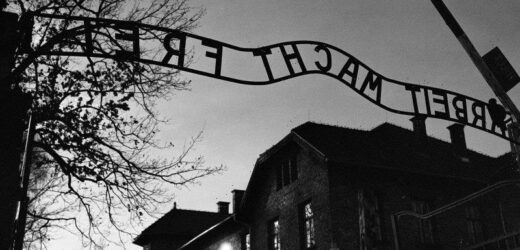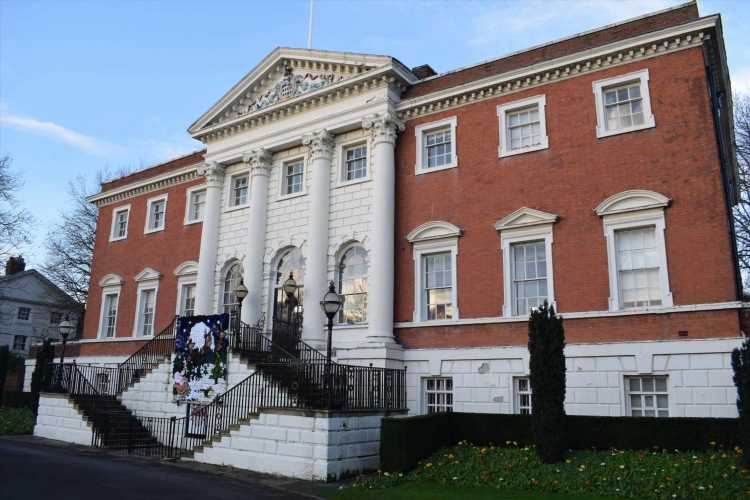Seventy-two years ago, as Soviet army forces pushed westwards through Poland and on to Berlin, they traversed regions destroyed by retreating German Nazis. In village after village, they witnessed the appalling aftermath of the brutality Nazis had inflicted on men, women and children.
And then, on 27 January 1945, the Russians arrived at the gates of Auschwitz and Birkenau.
The main entrance at the former Nazi death camp of Auschwitz in Oswiecim, Poland, with the inscription, “Arbeit Macht Frei”, which translates into English as “work sets you free”.Credit:AP
What confronted them was evil on a catastrophic scale. Here, in the freezing mud and filth of the massive Auschwitz complex, were a few thousand Jewish and Roma prisoners, barely alive.
Of more than 1.3 million Jewish, Roma, Polish and Soviet people whom the Nazis transported to Auschwitz between 1940 and 1944, at least 1.1 million were killed – most, in the hours and days after they arrived.
British forces were confronted by similar, unspeakable scenes when they arrived at Bergen-Belsen, as were United States troops when they got to Buchenwald and Dachau.
Yet, the persecution of the Jews had not been a secret anywhere in Europe. It had been the ruling Nazi Party’s very clear policy for more than a decade. It was enacted by stripping Jews of their citizenship, their cultural identity, their places of worship, by isolating them in ghettos, starving them into submission, and by murdering them en masse.
The world must never, ever forget.
And yet, an extensive survey, published by the Gandel Foundation and Deakin University researchers on International Holocaust Remembrance Day, found one-in-four Australians has little or no knowledge of the Holocaust.
Nearly one-third of young adults have little or no knowledge of the Holocaust, which suggests there is a vacuum of some kind in the modern curricular.
The Gandel-Deakin University survey also indicated Australians generally had a poor grasp of this nation’s strong connections to the Holocaust through the survivors and their children – and their children’s children – who, thankfully, live among us. Yet, they battle anti-Semitism and vicious slurs constantly.
Over the years, there have been people who falsely and maliciously denied the Holocaust occurred. There are others, including some conservative politicians and school authorities, who prefer to censor what really happened or change the filter to make it more acceptable to their blinkered worldview.
We have witnessed around the world a resurgence of fascists and neo-Nazis, whose perversely narrow, racist and violent view of the world is founded on deliberately inverted moral norms. And we have watched a clutch of politicians pander to those views – along the way, accentuating their own ignorance and the shabbiness of their moral compass.
During the pandemic in particular, there has been a proliferation of inaccurate and highly offensive commentary comparing government directives and vaccine mandates to the acts of Nazis or totalitarian dictators.
Such odious comments are designed to outrage. That is their purpose. Yet, every one reflects poorly on the person who uttered it. They serve to demonstrate how naïve they really are.
To be clear, there is no valid comparison to the acts and policies of the Nazis, to the Holocaust.
Federal and state governments could do much more to mitigate racial and religious vilification without encroaching on political free speech.
The Victorian government last year proposed introducing legislation that, among other things, would ban the use of the Nazi swastika. There is no draft bill yet. Similar legislation has been proposed by the Labor opposition in NSW.
The Gandel-Deakin survey found higher levels of awareness about the Holocaust tended to flow from access to specific school courses or through undertaking visits to Holocaust museums. Nearly 70 per cent of survey respondents supported compulsory Holocaust education in schools.
The nation’s education curriculum needs to reflect that popular support and provide appropriate and detailed subjects to raise knowledge about the Holocaust and the persecution of minorities generally.
That, in turn, will foster empathy and genuine awareness of the profound hurt caused by racism and anti-Semitism.
The Morning Edition newsletter is our guide to the day’s most important and interesting stories, analysis and insights. Sign up here.
Most Viewed in National
From our partners
Source: Read Full Article



